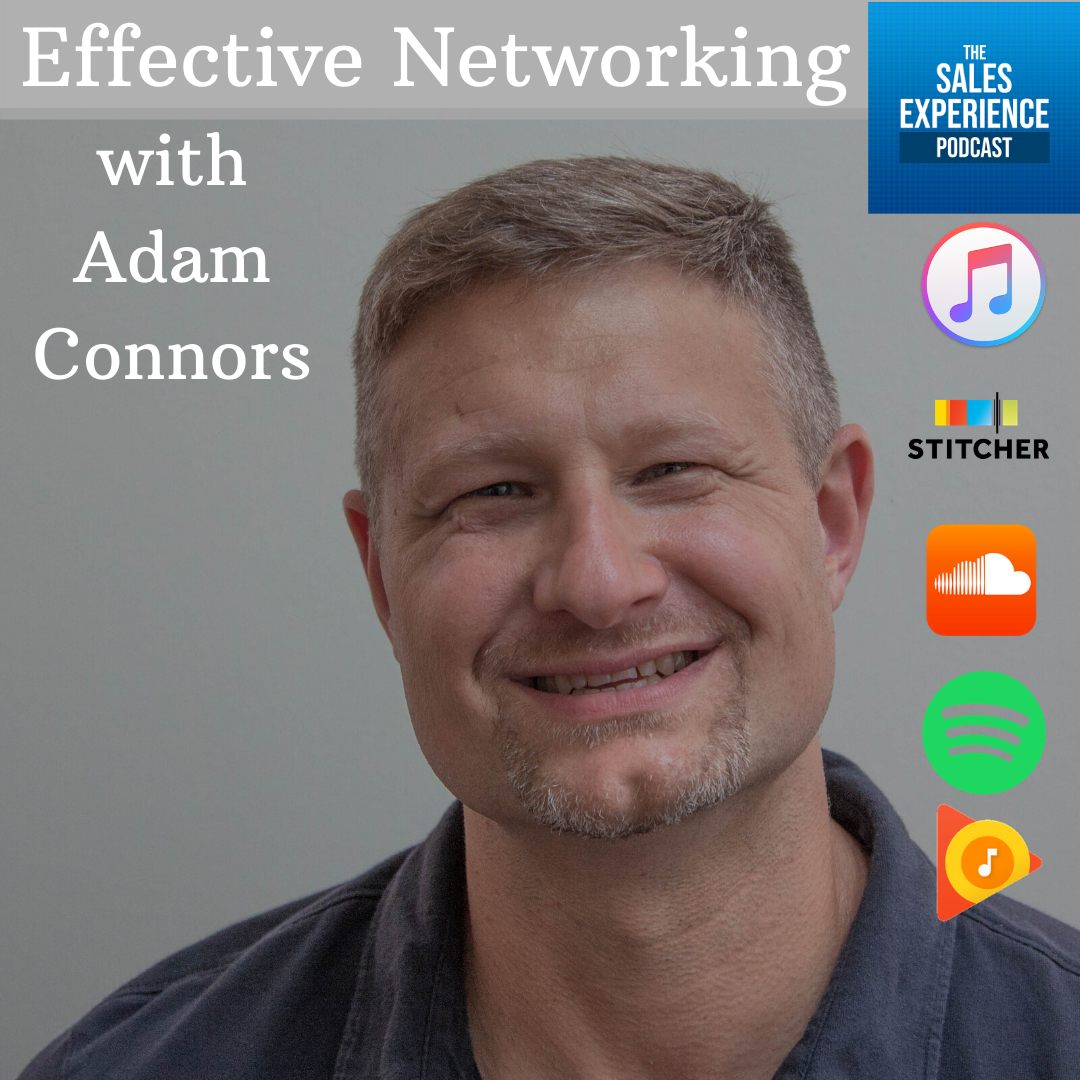Show Notes
For this week of answering questions, I want to focus on one question per episode (and still do my best to be 10 minutes (ish) or less.
In this episode, I answer the question “Why don’t my call backs answer when I call for our appointment?”
Ever have that happen to you? Seems like the prospects all suck because they don’t show for the call/meeting you set with them?
You may or may not like my reason why that happens.
Episode 56 - Transcript
Hi and welcome to another episode of the sales experience podcast. My name again is Jason Cutter. This is episode 74 part four of recruiting week or I'm talking about how to recruit in the right way for your organization. Now a lot of these tips, a lot of things that I'm covering is not a one size fits all. There's sometimes it is. However, a lot of times it's just going to fit. It depends on your organization, your culture, the type of people you're looking for. That's why I covered it in episode 71 on Monday this week where it's about the personality that fits best for you, but how to test for that, how to reverse engineer and create what that looks like for you and what that persona is that you know wins most of the time because people are people, people are messy, they'll trick you and fully all the time with do you think they're going to go one way and they go the other so you know you want to make sure you check up personality for you, your sales process, your sales cycle, and then everything else I've been covering this week.
Today I want to talk about your process for recruiting after the initial interview or what your whole process looks like. In general. I think it's very important to have your sales hiring, recruiting, flow, match what it is that you have as a sales cycle. Okay. If your sales cycle is really long for your product or service for, let's say it's business to business and you've got a long sales cycle, it's three months or six months, whatever that is. I'm not saying your recruiting process should be three or six months. However, I think that you should have something that's comparable to that relative to your recruiting process. Same thing. If you have a one call close and it's easy and it's simple, then that recruiting process is going to be much quicker. It's anywhere in between. You want to take that into account. Why do I say this?
Well, it's important to make sure that you put people through the paces of what matches what they're going to be doing in the sales process. There's a phrase that the military uses, which is practice like you fight, which means it's not about let's say paintball guns or plastic guns or plastic toys or you know, not really getting in the dirt and fighting or grappling. It's about just going like you would go in combat, you know, don't have combat the war zone. Have it be the time for discovery of how to actually fight or actually pull the trigger or actually jump out of the airplane. It's about doing all of those things in advance and practicing that so it becomes second nature when you're recruiting, especially for sales people, if you want to recruit like you fight like you want to recruit, like you sell and you want to put them through hoops and paces of what you expect.
One example as a hoop to put them through would be if you expect your salespeople to memorize a portion of the script, one good strategy could be as you're recruiting them as they're going through the process, you haven't hired them yet. It's to give them a sample script that you then expect them to memorize in a certain amount of time. Could be hours, could be days, and then you bring them back in and have them do it for you off the top of their mind and see if they're capable of that. If they can't memorize that, how do you think they're going to memorize the script sitting at their desk and be able to do it perfectly under the pressure of a phone call with a prospect who's breathing down their neck. You've got a sales manager behind them. There's all this pressure, all that training goes out the window, like literally the adrenaline's running.
They'll forget everything. So if they can't do it during the recruiting process, how can you expect them? There's some people amazing at memorizing anything, memorizing scripts. There's others, they're terrible at it and you give them something to memorize. Then they're going to freestyle and they're going to ad Lib and they're going to paraphrase it. And they'll probably tell you that they did it exactly right. And they think they read it word for word from their memory when in fact they didn't. And I'll tell you just based on experience. And that same person will be the same person when they get in the seat where they'll take your script, they'll add lib, they'll paraphrase, they'll think they're doing it right when they're in fact not. And then a, they won't close deals or B, they won't be compliant and they'll cause all kinds of problems for you.
So make sure you're putting people through a level of testing hoops, challenges, callbacks. You know, one of the interesting things depending on the level that you're at, is you want a tenacious salesperson. You want somebody, if your role calls for a tenacious salesperson or tenacious cold caller, you know, appointments set or whatever that might be, then you want to hire somebody and almost simulate that same process. If you need somebody who calls and is relentless and will call multiple times, then maybe you don't want to be the one that's always reaching out and following up with the applicant. You want to see, okay, if I give this applicant three, four days, are they going to reach out to me? Do they send a followup email? Do they call me and say, Hey, I'm just checking in on my application and seeing when the next step is because how they handle the recruiting process, how they sell you on them, whether it's aggressive, it's outward, it's pursuing it, it's really going after it, or if it's on the other end where it's passive and they're just expecting you to call them, they're expecting you to close the deal for them.
They're expecting you to give them what they think is the right offer with the right terms and the right schedule. Both of those and anyone in the middle watching those actions really close during the recruiting process. We'll tell you a lot about who that person is, their personality, their sales style and I'll tell you based on my experience, most of the time that's exactly who they're going to be. Once their butt is in that seat, once they're in that seat or on your retail floor or anywhere in a sales role, they going to be the same person they were during the recruiting process. And it's important to make sure you build your process again, whether it's the number of times you call or don't call somebody. Like for me example, if somebody is applying for a job and it's sales, I call you and leave you a message.
I'm not calling you and leaving another message. I'm not chasing you. You should be chasing me. Cause if I'm chasing you and then what happens when I put you in the sales role, you're going to expect all your prospects to be you as well. And it's not going to work. Trust me. So you want to make sure that your process matches what you expect from the salesperson and the number of hoops. Maybe memorizing a script is important for you. And so you want that to be a test that you haven't go through. Maybe computer based, you know it's a lot of online stuff, but you know, they're just going to be reading scripts. So what kind of tests can you give them there? How many hoops, how long of a process, you know, how long should you either drag it out or speed it up?
What's the right timing to create the right level of candidate who will go through those paces and then be able to be successful on your sales team in the role that you have? Four, right? If we look at the military, they have bootcamp, you know, it's six weeks at eight weeks, and then they go into something else and then they have more training and more training, more training. Literally, they're not just taking somebody in and throwing them into battle. They're practicing like they fight, they're getting them set up, they're getting them ready and in my opinion, that starts with the recruiting process. If you have a longer sales cycle and you're just slamming people through or you have a sales process that involves some hunting down people and not just order taking on the inbound, then you've got to make sure you match that with your recruiting style.
I hope that helps for the recruiters, the hiring managers, the sales managers, everyone involved with that process creation. If you listening to this, I hope this helps you build the right recruiting process and if you're in sales or you're looking to get into sales, keep that in mind as well. Just be really observant if you can't have the hiring process and how a company goes and then also understand that you're going to be you and you're going to bring who you are and this is where it's good to be mindful if you're on the candidates side is that not every job, not every opportunity in every company is a good fit. You want to make sure that it feels right for you as well. If they're having you memorize scripts and you don't like memorizing scripts, you don't like using a script, then that should be assigned that maybe that's not the right organization for you.
If they don't have any steps in the process and they're just hiring people at women, just whoever sounds good and has a pulse and they're throwing them on the sales floor. If that fits for you and you know that you can adapt really quickly, you can learn things really fast. You're going to put in the extra effort during work and after work to become really good at it and you're okay being thrown into the game without much prep. Fantastic. Go for it. If you know you need more prep and you don't have the skills or you need more kind of coaching and assistance, which is not a bad thing, but if you know that about yourself, then maybe that's not the right organization. I appreciate everybody who listens to these episode. Thank you so much. Make sure to subscribe. Send me a message through the cutter consulting group.com website through linkedin. And as always, remember that everything in life is sales and people remember the experience you gave them.
![[E56] This is folder testing](https://episodes.castos.com/salesexperiencepodcast/images/Authentic-Persuasion-Show-Cover-1400.png)


